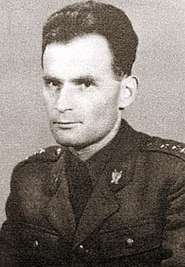Stefan Michnik
Stefan Michnik ([ˈstɛfan ˈmixɲik] born 28 September 1929, in Drohobycz (at the time, part of the Second Polish Republic; now Drohobych, Ukraine), is a former Stalinist military judge of the Soviet-dominated regime in post-World War II Poland, and a former captain in the communist Polish People's Army. He was involved in the politically-motivated arrest, trial, imprisonment and/or execution of a number Polish anti-communist fighters and activists.[2] Many of those persecuted by Michnik also fought against Nazi Germany during World War II, as members of the Polish resistance.[3]
Stefan Michnik | |
|---|---|
 | |
| Born | 28 September 1929 Drohobycz, prewar Second Polish Republic (now Ukraine) |
| Other names | Karol Szwedowicz nom de guerre Kazimierczak |
| Citizenship | Polish, Swedish |
| Occupation | Judge, communist security agent.[1] |
| Known for | State Security Services (Urząd Bezpieczeństwa) |

After de-stalinization, Michnik went into exile in 1968, and has lived in Storvreta, Sweden.[4]
After the collapse of communism in Poland (1989), Michnik was formally implicated by the Polish justice system in zbrodnie komunistyczne ("communist crimes") relating to his tenure as a military judge.[5]
Life
Stefan Michnik was the son of Helena Michnik and Samuel Rosenbusch nicknamed "Emil" or "Miłek" (born around 1904). His mother was a Polish-Jewish teacher in Drohobycz and an activist for the Communist Party of Western Ukraine , the Communist Party of Poland, and the Stalinist Union of Polish Patriots. His father was a Jewish lawyer and communist activist, executed around 1937 in the Soviet Union during the Great Purge.
Michnik's half-brother (on his mother's side) is Adam Michnik,[6] the editor-in-chief of the Polish newspaper, Gazeta Wyborcza.
Judicial career
Michnik became a judge in postwar Poland after completing an eight-month course for military judges in Jelenia Góra.[5] He was first recruited by the Information Bureau under the pseudonym Kazimierczak but fired 11 months later, and was given severance pay of 1,000 zloty.[5]
At the beginning of 1951 Michnik was assigned a position with the Warsaw Regional Military Court (Wojskowy Sąd Rejonowy, WSR) and two weeks later imposed his first sentence against Stanisław Bronarski,[5] charged with anticommunist activities, while he was a member of the AK, NSZ and NZW. Bronarski (exonerated in post-communist Poland)[7] was given five consecutive death sentences and executed on 18 January 1951 at the Mokotów Prison.[7] Michnik took part in the Trial of the Generals, dubbed a judicial murder by historians, with 40 death sentences pronounced in the fall of 1951, half of them carried out (see list of the 21 executed officers by name,[8] with Stefan Michnik as one of the sentencing judges).[8]
Emigration
After being denied a US visa, Michnik fled Poland for Sweden during 1968 Polish political crisis. He lived as a retired librarian in a small town of Storvreta near Uppsala.[1][9] He is currently in a nursing home in Gothenburg.
He was a contributor to Culture, Polish-émigré literary-political magazine, for which he wrote articles both as Karol Szwedowicz and under his own name.
Since August 2007 the Polish Institute of National Remembrance deliberated on a motion to request his extradition.[3] On 25 February 2010, the Military Garrison Court in Warsaw at the request of the investigation division of the IPN issued an official arrest warrant for Stefan Michnik.[10] In October 2010, Polish prosecutors issued a European Arrest Warrant (EAW) on the same basis.[11] On 18 November 2010, the court in Uppsala refused to extradite Stefan Michnik back to Poland explaining that his alleged criminal acts (see communist crime) committed in Poland fall outside the statute of limitations in Sweden.
On 8 November 2018, the Military Court in Warsaw issued for the second time a European Arrest Warrant in connection with 30 offences that Michnik committed in the years 1952–53 against representatives of the democratic opposition and former members of the Underground State, including unlawful death sentences.[12] Michnik has claimed that he wasn't aware of the death sentences, who, according to him, was a decision made higher up in the judicial hierarchy.[13] A Swedish court in Gothenburg refused Poland's appeal for the extradition of Stefan Michnik.[14]
Notes and references
- Piotr Gontarczyk, "Agent Michnik", Wprost weekly, No: 30/2007 (1283), accessed 31 January 2011.
- IPN (2007). "Przegląd mediów - 20 lutego 2007". Instytut Pamięci Narodowej. Archived from the original on 16 October 2010. Retrieved 28 December 2013.CS1 maint: unfit url (link)
- Maciej Korkuć, IPN, "Fachowiec bezprawia. Dlaczego IPN chce ekstradycji stalinowskiego sędziego Stefana Michnika," Wprost weekly, No. 8/2007. See also: Serwis prasowy IPN (press release); 20 February 2007. Institute of National Remembrance
- Tadeusz M. Płużański. "Stefan Michnik". Oczekujemy kolejnych ekstradycji. Publicystyka Antysocjalistycznego Mazowsza. Retrieved 28 December 2013.
- Dr. Piotr Gontarczyk, Agent Michnik. Wprost, 30/2007 (1283). Page 2 and 3.
- Pacholczykowa, Alicja (2010–2011). "Ozjasz Szechter". Polski Słownik Biograficzny. 47. Polska Akademia Nauk & Polska Akademia Umiejętności. p. 585.
- Paweł Felczak (2012-03-02), Bohaterowie, a nie zbrodniarze. Płock for You. Aktualności.
-

- Jerzy Stokowski, "Zbrodnie w majestacie prawa 1944-1956 (III)" Edukacja Prawnicza, 12 (75) December 2005. Made available by Fundacja Pomocy Młodocianym Więźniom Politycznym lat 1944-1956 "Jaworzniacy"; Jerzy Stokowski, Jerzy Prószyński.
- Polish Press Agency (PAP), "Wydano nakaz aresztowania stalinowskiego sędziego Stefana M." Gazeta.pl, 25 February 2010.
- "Nakaz aresztowania stalinowskiego sędziego już w Szwecji." Gazeta.pl, 27 October 2010, accessed 31 January 2011.
- "Nakaz aresztowania Stefana Michnika". wyborcza.pl (in Polish). Retrieved 9 November 2018.
- "Aftonbladet nyheter: Polen ska begära svensk utlämnad". wwwc.aftonbladet.se. Retrieved 3 November 2019.
- "Sweden refuses extradition of Stalinist judge". The First News. 19 December 2019.
Further reading
- Aldona Zaorska, Sąsiedzi. Najbardziej okrutni oprawcy polskich patriotów, Warszawa 2012, ISBN 978-83-932704-4-6.